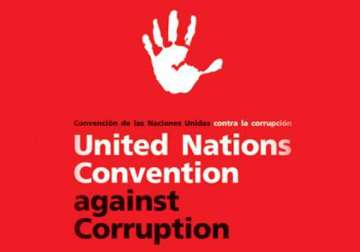Kabul, May 12: India today ratified UN Convention Against Corruption which will help it deal with the problem of black-money and corruption through legislative and administrative measures.
The Convention, ratified six years after it was signed by India, will help the government to seize illicit money and assets, Indian government officials said.
“India has completed the process of ratification of UN Convention Against Corruption,” an official said.
According to the UN Convention, each member country shall “consider adopting appropriate legislative and administrative measures, consistent with the objectives of this Convention and in accordance with the fundamental principles of its domestic law, to prescribe criteria concerning candidature for and election to public office.”
It also prescribes disciplinary or other measures against public officials who violate the codes or standards established in accordance with this article.
“The ratification of the Convention is reaffirmation of our government's commitment to fight corruption and to undertake vigorously administrative and legal reforms to enable our law enforcement agencies to recover illicit assets stolen by corrupt practices,” the official said.
The completion of the ratification process has been under active consideration of the Indian government since September last year, the official said.
A Group of Ministers has been overseeing the ratification process.
Before ratifying the UN Convention, government was required to make changes in domestic laws to have more transparency in funding election campaigns and political parties among other crucial legislative steps to bring it at par with the international instrument.
The Convention has already been inked by 140 countries.
In the backdrop of agitation by Anna Hazare-led civil society activists, questions had been raised recently on why India was not ratifying the convention even six years after signing it.
Meanwhile in New York, the instrument of ratification was officially deposited with UN Secretary General Ban Ki-moon on May 9. “We are now a state-party,” Manjeev Singh Puri, India's deputy envoy to the UN, told PTI. The instrument of ratification was submitted after the convention was approved by the Indian government and signed by President Pratibha Patil.
“Corruption is an insidious plague that has a wide range of corrosive effects on societies. It undermines democracy and the rule of law, leads to violations of human rights, distorts markets, erodes the quality of life and allows organized crime, terrorism and other threats to human security to flourish,” the convention reads.
“This evil phenomenon is found in all countries-big and small, rich and poor-but it is in the developing world that its effects are most destructive,” it says. Anti-corruption activists in India have been pushing hard for India to join the convention.
The convention will also make it easier for India to repatriate billions of dollars in black money alleged to have been stashed away overseas.
Global Financial Integrity, a Washington, DC based non-profit, has estimated that at least USD 462 billion was illegally transferred overseas from India between 1948 and 2008. PTI
Latest India News
